
Cloudways is easily one of the most famous cloud hosting options on the market. During our Cloudways review, we realized it offers plenty if you’re into cloud hosting. However, with many qualities came a few flaws that ultimately resulted in a stellar but not otherworldly experience. So, do we recommend Cloudways after our thorough analysis? The answer is: it depends.
We think there are better cloud hosting offers, especially for managed WordPress hosting and security. However, if you’re hell-bent on exploring it but aren’t sure if you should splurge your money, read this hands-on Cloudways review for 2025, where we tested the service for you.
Cloudways Review: Pros & Cons
Pros
- One of the fastest cloud hosting options
- Low-cost plans (starting at $11/mo)
- Website staging environment
- Responsive customer support
- No limits on visitors and websites
Cons
- Limited security
- No free domain
- Fully managed plans are pricier
Is Cloudways a Cloud Hosting Provider?
Before we start discussing Cloudways, it’s important to understand what it is.
This is not a ‘direct’ cloud hosting service. It doesn’t own any servers. Instead, it offers services from some of the best cloud hosts, such as DigitalOcean, Amazon Web Services, Google Cloud, etc.
When you purchase a plan from Cloudways, you can choose the host and your resources. Therefore, Cloudways acts like a middleman between you and the “real” hosting provider. This results in a slightly more complex setup, especially if you’re a beginner. In that case, you can check our favorite Cloudways alternatives.
So, to clarify again, the company focuses on reselling cloud hosting services, rather than offering its servers. Since it’s about cloud hosting, you also won’t find traditional shared, VPS, or dedicated server plans.
Pricing, Plans, and Features
Speaking of plans, it’s time to examine them and see how much Cloudways costs in 2025.
Cloudways relies on five cloud hosting providers, including:
- DigitalOcean, starting at $11 monthly
- Vultr, starting at $14 monthly
- Linode, starting at $14 monthly
- Amazon Web Services, starting at $20.56 monthly
- Google Cloud, starting at $37.33 monthly
Their starting prices aren’t too high, and DigitalOcean is the most affordable choice.
Pricing flexibility is one of its advantages or flaws, depending on how you look at it. For instance, DigitalOcean has Standard and Premium plans, with their Basic, General Purpose, and CPU-Optimized versions. In total, DigitalOcean offers over twelve plans to pick from.

We reviewed Cloudways’ Basic Micro plan, which costs $14 monthly and includes 1 GB of RAM, a single vCPU core, 25 GB of NVMe storage, and 1 TB of bandwidth.
Purchasing AWS or Google Cloud plans is a substantial investment, kicking Cloudways off our list of the cheapest web hosts. At a minimum, they cost $20.56 monthly and are better for demanding users and/or companies. Some plans go up to $3,500 monthly, depending on the rented resources.
It’s impossible to analyze each plan in this Cloudways review, so it’s best to refer to the official website and examine them. Using the button below, you can also test Cloudways for three days without a credit card.
Features in All Plans
Regardless of the plan, Cloudways has set in stone a few features it always offers.
The most obvious are:
- Unlimited visitors
- Unlimited websites
However, Cloudways also comes with:
- Free migrations
- Free SSL certificate
- Object Cache Pro
- Redis Cache
- Automated backups
- Auto-healing cloud servers
- Vertical scaling
- Advanced Staging & Cloning, and more.
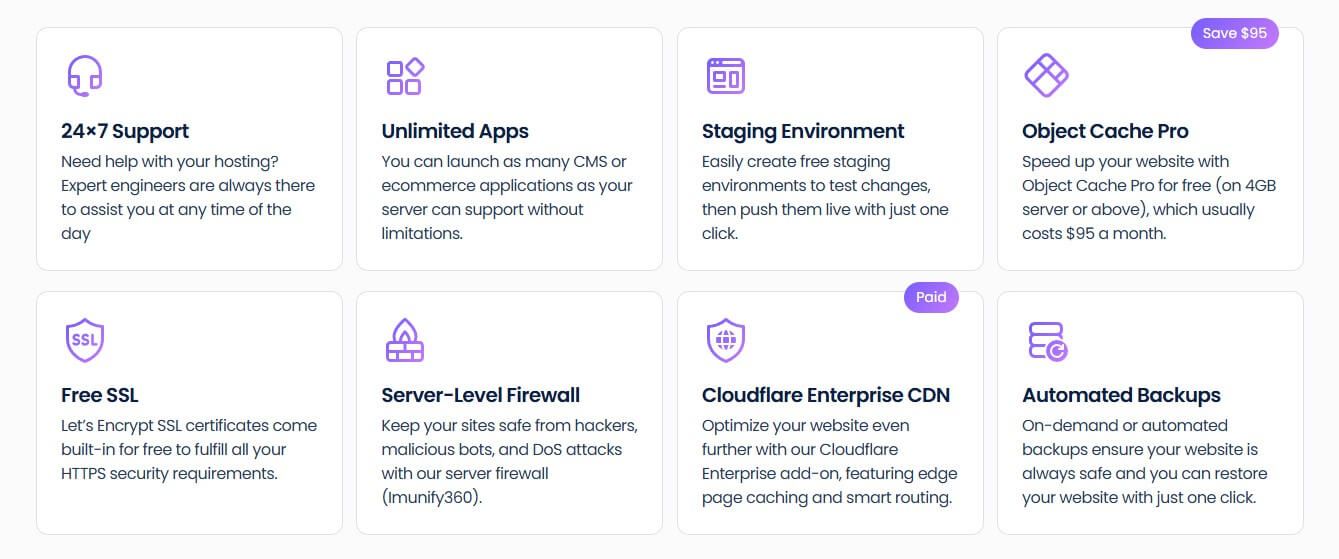
We’ll address free migrations because they’re paid in GreenGeeks, making Cloudways just a tad more generous. We also like its automated backups and semi-managed hosting, which still leaves some control to the user. Cloudways offers fully-managed WordPress plans, though.
However, you’ll have to spluge $90 a month for dynamic sites and $145 for WooCommerce sites. We suggest these cheaper WordPress hosts that provide more at modest prices.
Is Cloudways Easy to Use?
If you’re used to cPanel or even hPanel from Hostinger, Cloudways will feel different.
The provider uses an in-house control panel for hosting management. Yes, some things are slightly more complex compared to traditional web hosting, but generally, we had no issues with navigation and hosting setup.
Once we subscribed, we clicked ‘Launch‘ to start our server.
After that, we had to wait for a few minutes for deployment. Ours was done in about fifteen minutes, but some people wait for less. With the initial setup out of the way, you’re free to install applications on your server.
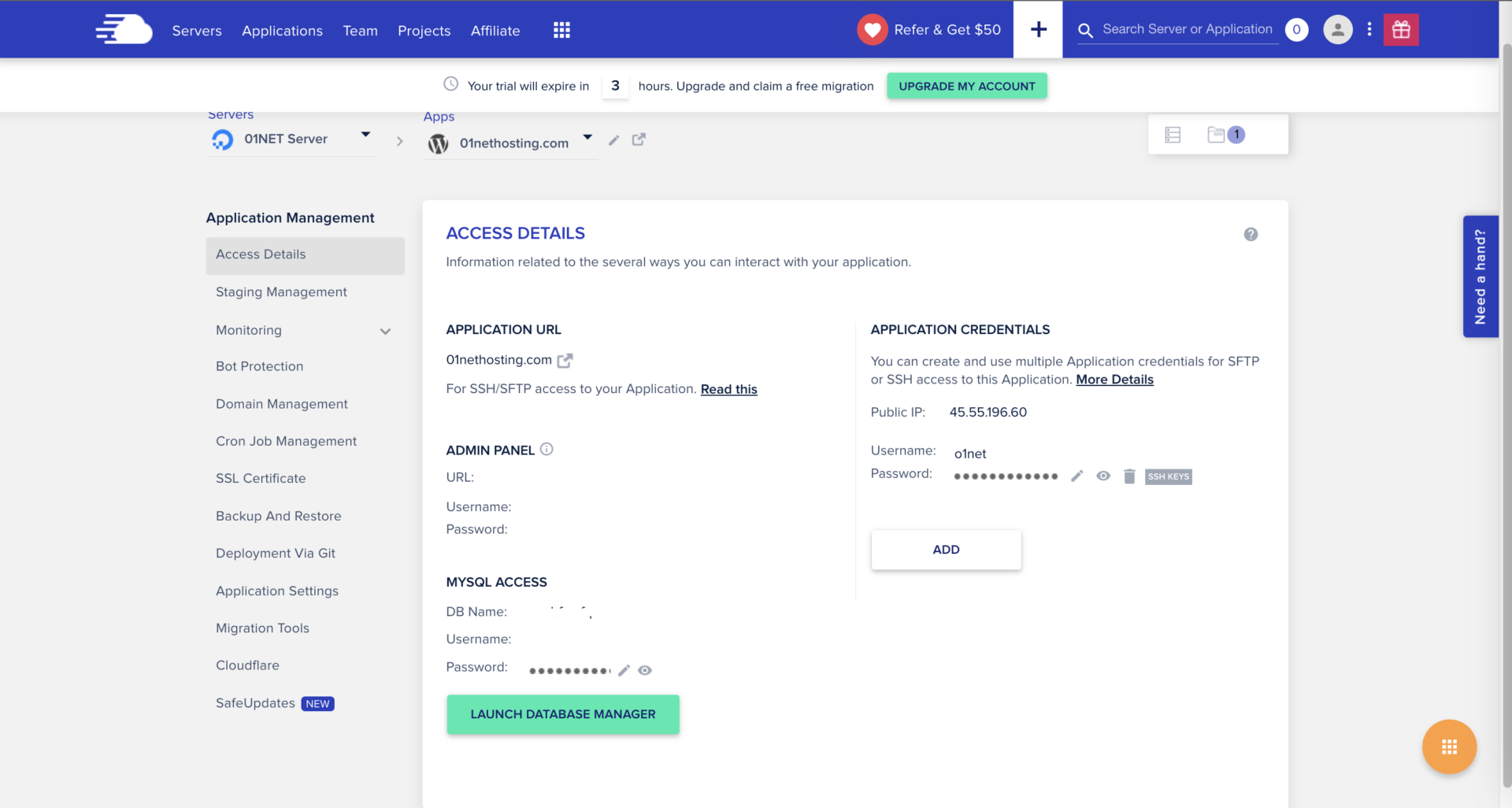
Installing WordPress
If you haven’t pre-installed any apps, you’ll have to do it manually.
To do this, go to Servers and select Applications. Then, use the fluorescent “+Add Application” button and select the one you want. You’ll find WordPress at the top, so click it, and Cloudways will install it for you in a minute.
It’s worth noting that Cloudways can be used as Laravel hosting, as this app and Magento are listed. Alternatively, you can install WooCommerce + WordPress if you want to build an online shop.
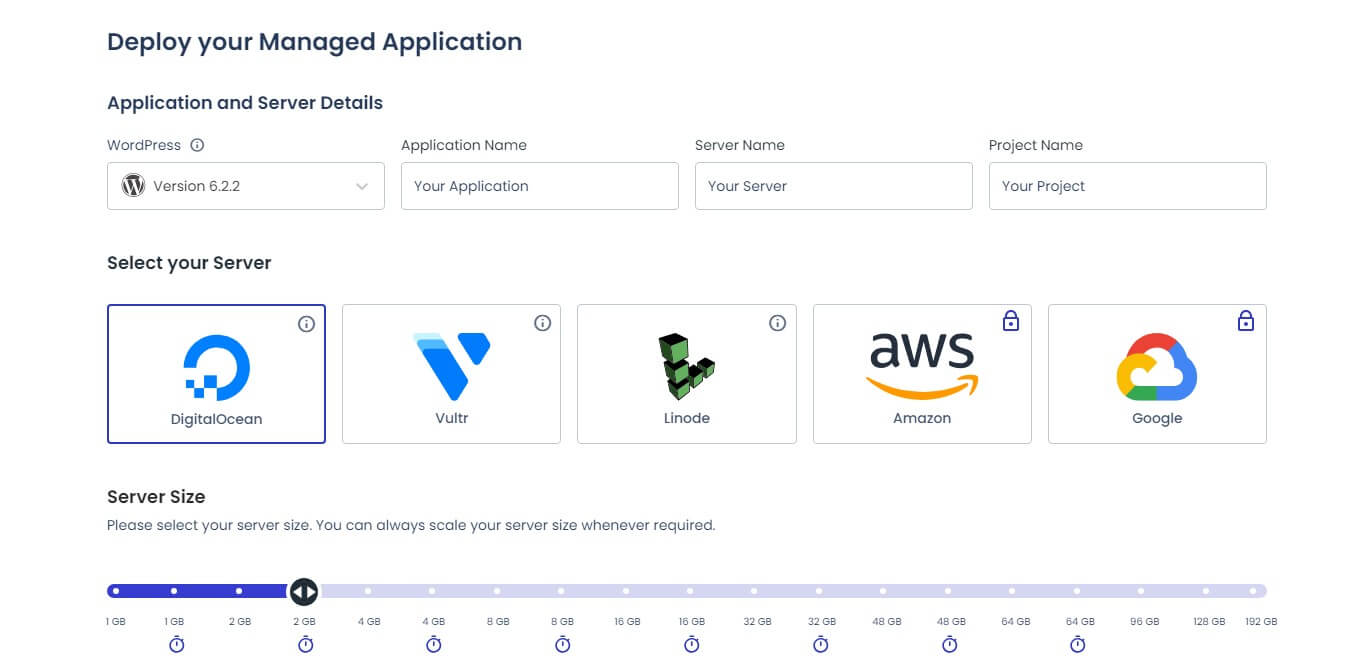
One thing we found disappointing is the lack of support for PHP apps. Yes, you can install them, but manually, which tells us that PHP app support isn’t up to par. Meanwhile, Hostinger, which we reviewed recently (read the Hostinger review here), fully supports PHP apps on its VPS and cloud servers.
Adding an SSL Certificate
Earlier in this Cloudways review, we mentioned a few complex things. The initial setup requires more manual labor than that in Hostinger or SiteGround. For instance, the provider doesn’t apply your SSL certificate, so you have to do it on your own. Thankfully, it’s simpler.
Go to Application Management, select SSL Certificates, and provide your domain name.
The drop-down menu lets you choose the SSL certificate; Cloudways offers Let’s Encrypt. Click it, select Install Certificate, and you’re set. Bear in mind that you can apply your SSL certificate to multiple sites this way. Click Add Domain and repeat the process.
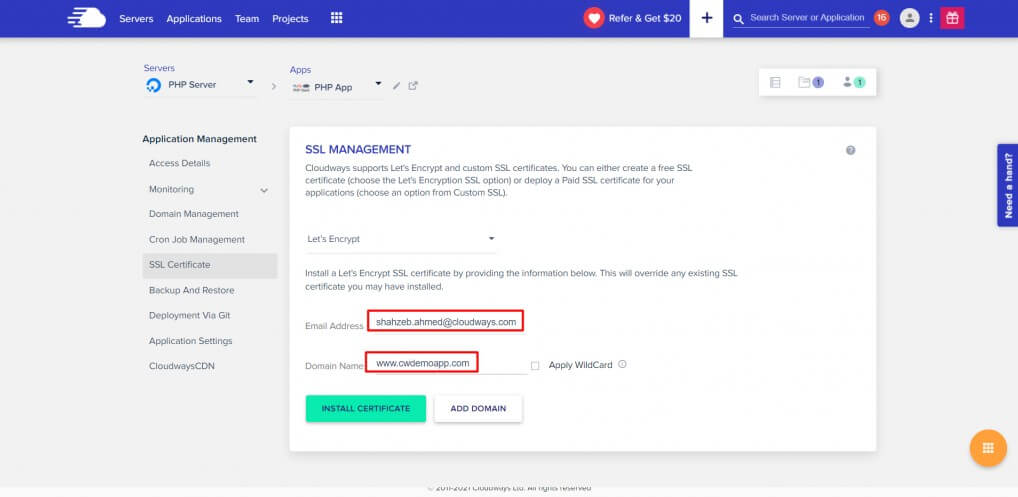
How Do Domain Names Function in Cloudways?
We nearly forgot to address domain names.
Unlike Hostinger, SiteGround, or even Bluehost, Cloudways doesn’t offer free domain names. It doesn’t even sell them, which means you have to buy one from a third-party company. You can do this through Hostinger or even GoDaddy, another popular domain name registrar.
From here, go to Domain Management under Application Management, and provide the domain name in the empty “Primary Domain” text box. Click Save Changes and then point the domain to the server.
Cloudways explains how to do this on its site. Conversely, you can contact its customer support and they’ll explain how to create an A record to point the domain to the server. Ultimately, you’ll wait about a few hours for DNS propagation. Sometimes, it’s way less.
Cloudways Staging Review
If you scroll back up the Cloudways review, you’ll notice we mentioned staging.
Staging allows you to make a couple of website copies and experiment on them without affecting the site’s live version. Cloudways did a fantastic job here, allowing you to copy your website in mere seconds.
Go to Applications and next to Your Application, select Clone App/Create Staging.

Now, select the server where the copy will be stored. Remember that Cloudways lets you host unlimited websites, so you can make a million staging copies and it won’t bat an eye.
When you open the staging website, you’ll notice the same settings. However, you can immediately apply new changes to the live version by selecting “Copy Data from Staging to Live“. Alternatively, you can pull the changes from the live to the staging version.
Cloudways Performance Review: Is It Fast?
Cloud hosting is naturally faster than shared hosting, so we expected phenomenal results in this Cloudways review. As explained previously, we tested its Basic Micro plan, which, while the least expensive, offers enough resources to handle serious traffic and workload.
To test Cloudways, we installed WordPress and created a website, importing a few dozen compressed images and adding a nice blog section. From there, we tested Cloudways using Loader, Pingdom, and GTmetrix, measuring its load times.
Cloudways Response Time & Uptime Results
We used Loader to measure its response times and measured an average of 30 ms.
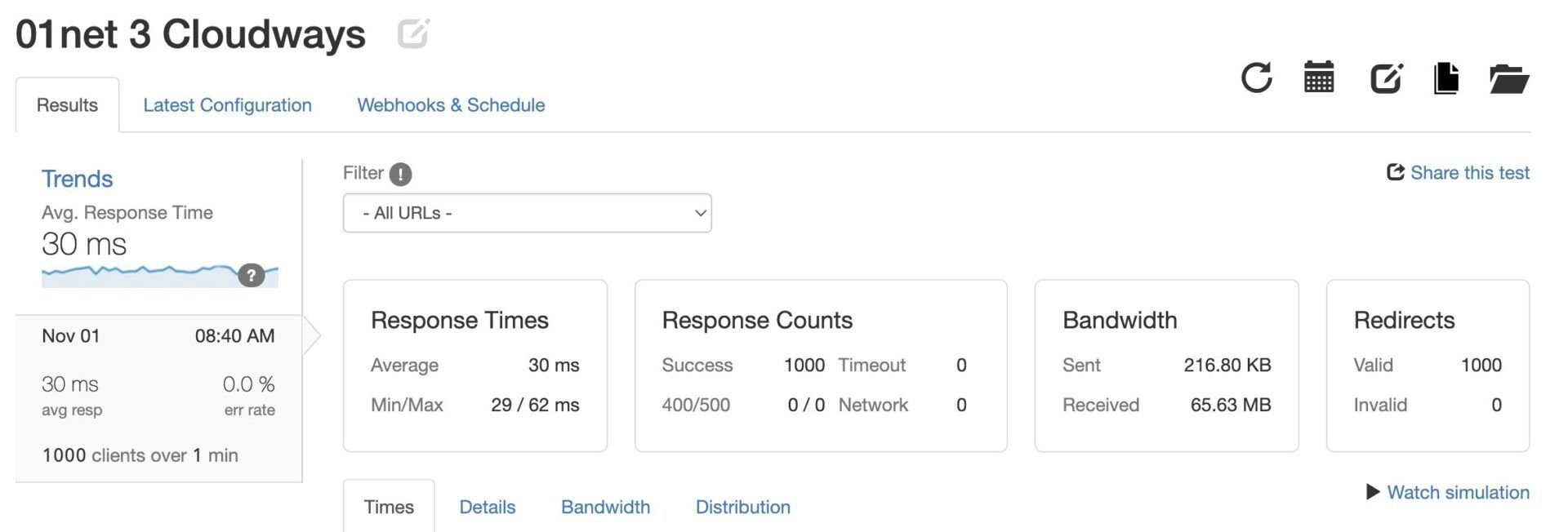
The lowest response time was 29 ms, and the highest, with a higher traffic load, was about 62 ms. This is an excellent result for cloud hosting, meaning that the server responds quickly enough to the user’s requests. We’ve seen better results, but these are phenomenal.
What about uptime?
For this test, we used Pingdom and examined Cloudways over the past few months. Our result was 99.9%, with one minor downtime of merely a few minutes. As Cloudways promises 99.90% and achieves 99.90%, we’d be crazy to complain about anything.
GTmetrix Speed Test Results
Cloudways is among the fastest hosts, and our GTmetrix speed test results attest to that.
We hosted our WordPress website on the US server from DigitalOcean, but performed our test using GTmetrix’s Canadian (Vancouver) server. During our Cloudways review, we observed these parameters:
- TTFB or Time to First Byte
- FCP or First Contentful Paint
- LCP or Largest Contentful Paint
- FLT or Fully Loaded Time
- TTI or Time to Interactive

The results are in the table below or the screenshot above:
| TTFB | 391 ms |
| FCP | 531 ms |
| LCP | 766 ms |
| FLT | 1.0 s |
| TTI | 531 ms |
All things considered, Cloudways performs exceptionally. Its response times were some of the lowest we’ve seen, especially during high-traffic “situations”. With a 30 ms average response time, Cloudways is nearly on par with VPS and even dedicated server performance.
We’ve seen faster picks in terms of load times. Read our WPX vs. Cloudways comparison, and you’ll notice that WPX is a bit faster. However, even these results are comfortably inside the so-called “industry standards,” resulting in a responsive, snappy, and smooth experience.
Cloudways Security Tested: Is It Good?
If you’ve come to this Cloudways review for security, you’re lucky we analyzed it for you.
Cloudways offers a few handy features, although we’d love to see more of them. So, here’s what you get when you purchase Cloudways:
- Free Let’s Encrypt SSL
- Firewall + IP blocking
- Automated daily backups
- WordPress Vulnerability Scanner
- Auto-Healing servers
The list is rather short, especially compared to Hostinger, which offers malware protection, a managed Web Application Firewall, proactive website monitoring, and more. The good news is, Cloudways also offers these, but you have to spend extra, which doesn’t really feel fair.
For instance, malware protection costs $4 per app per month. So, if you have two websites (or apps), you’ll spend $8 monthly to protect both. Cloudways also has something called SafeUpdates, which updates vulnerable plugins and themes on your WordPress website.
Priced at $3 per app/site per month, it again increases the overall price.
When you pack everything up, Cloudways can be highly secure and reliable, but at a price you may not be ready to pay. We’ll remind you that Cloudways lacks a free domain and WHOIS privacy, so consider this investment if you think about using this cloud hosting.
You can get a free domain from Hostinger even if you choose its Cloud Startup plan, for example. This gives you reputable cloud hosting PLUS a free domain AND domain (WHOIS) privacy for a year.
Customer Support
In our Cloudways review, we were pleasantly surprised by its customer support.
Two primary means of support include:
- Live chat
- Ticketing system
We preferred live chat, where Cloudways always responded in a timely manner and aided our cause. However, the initial contact is with a chatbot, which you can sidestep by requesting human support, especially if the bot can’t help you. Are humans helpful enough? Drawing from our experience, they are.
Cloudways is nice enough to ask for your email if the conversation abruptly ends. This way, it can get back to you via email. We also tried its ticketing system, where we would fill out the support request and send it. Response times in this case were longer, but we rarely had to wait for more than an hour.
It’s worth noting that Cloudways has a comprehensive knowledge base. It’s extensive, so finding solutions to frequent issues is no fuss. Dorung our review of Cloudways, we noticed that you can also purchase the so-called Advanced Support Addon at $100 monthly.
This level of support extends to themes, plugins, performance optimization, and more.
While it’s fantastic overall, we’re sure not many of you will justify spending a hundred quid on support alone, especially if you’ve already splurged on SafeUpdates and Malware Protection.
Final Thoughts
To conclude this Cloudways review, we must say we like what it offers in 2025.
Cloudways offers fairly priced cloud hosting plans that excel in flexibility, raw performance, and helpful features, such as staging and daily website backups. However, it leaves something to be desired regarding security and ease of use, as cheaper picks, such as Hostinger and SiteGround, easily overtake it.
So, let’s again address this question: Do we recommend it?
We said, “It depends,” and it still rings true. If you need powerful and scalable cloud hosting and, above all, aren’t a beginner, Cloudways will tick many boxes. If you prefer fully managed WordPress hosting and prioritize ease of use, options like Hostinger and SiteGround are better.
Now that you know all the ins and outs of Cloudways, it’s your decision where to go from here.